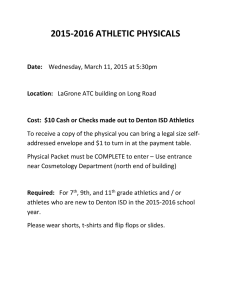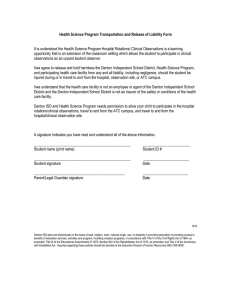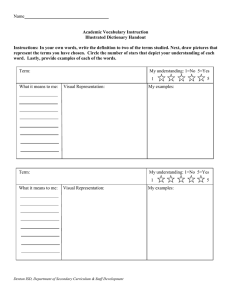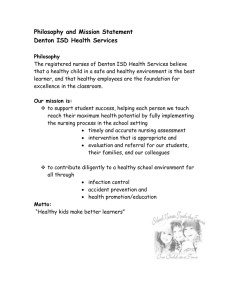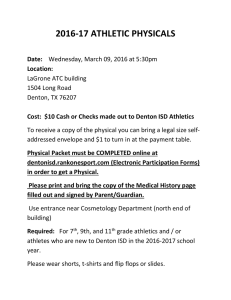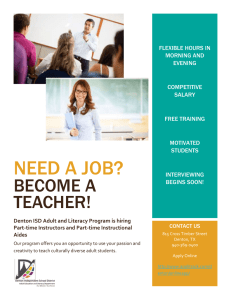Health Science (Hospital Rotation) 1504 Long Rd Denton, TX 76258
advertisement
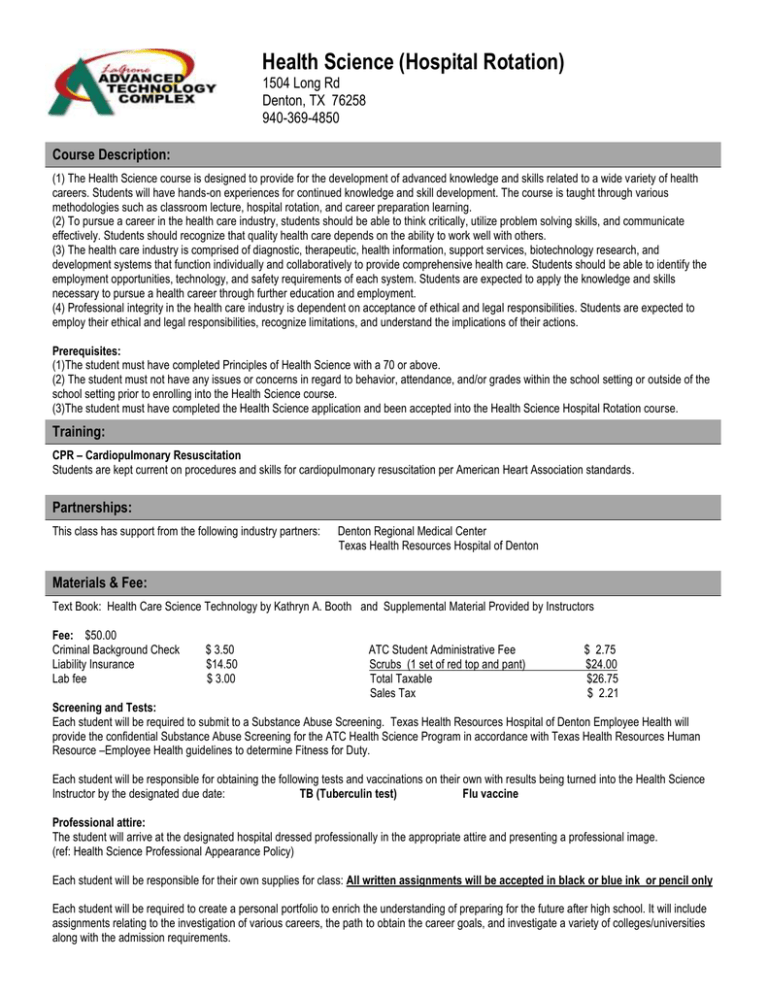
Health Science (Hospital Rotation) 1504 Long Rd Denton, TX 76258 940-369-4850 Course Description: (1) The Health Science course is designed to provide for the development of advanced knowledge and skills related to a wide variety of health careers. Students will have hands-on experiences for continued knowledge and skill development. The course is taught through various methodologies such as classroom lecture, hospital rotation, and career preparation learning. (2) To pursue a career in the health care industry, students should be able to think critically, utilize problem solving skills, and communicate effectively. Students should recognize that quality health care depends on the ability to work well with others. (3) The health care industry is comprised of diagnostic, therapeutic, health information, support services, biotechnology research, and development systems that function individually and collaboratively to provide comprehensive health care. Students should be able to identify the employment opportunities, technology, and safety requirements of each system. Students are expected to apply the knowledge and skills necessary to pursue a health career through further education and employment. (4) Professional integrity in the health care industry is dependent on acceptance of ethical and legal responsibilities. Students are expected to employ their ethical and legal responsibilities, recognize limitations, and understand the implications of their actions. Prerequisites: (1)The student must have completed Principles of Health Science with a 70 or above. (2) The student must not have any issues or concerns in regard to behavior, attendance, and/or grades within the school setting or outside of the school setting prior to enrolling into the Health Science course. (3)The student must have completed the Health Science application and been accepted into the Health Science Hospital Rotation course. Training: CPR – Cardiopulmonary Resuscitation Students are kept current on procedures and skills for cardiopulmonary resuscitation per American Heart Association standards. Partnerships: This class has support from the following industry partners: Denton Regional Medical Center Texas Health Resources Hospital of Denton Materials & Fee: Text Book: Health Care Science Technology by Kathryn A. Booth and Supplemental Material Provided by Instructors Fee: $50.00 Criminal Background Check Liability Insurance Lab fee $ 3.50 $14.50 $ 3.00 ATC Student Administrative Fee Scrubs (1 set of red top and pant) Total Taxable Sales Tax $ 2.75 $24.00 $26.75 $ 2.21 Screening and Tests: Each student will be required to submit to a Substance Abuse Screening. Texas Health Resources Hospital of Denton Employee Health will provide the confidential Substance Abuse Screening for the ATC Health Science Program in accordance with Texas Health Resources Human Resource –Employee Health guidelines to determine Fitness for Duty. Each student will be responsible for obtaining the following tests and vaccinations on their own with results being turned into the Health Science Instructor by the designated due date: TB (Tuberculin test) Flu vaccine Professional attire: The student will arrive at the designated hospital dressed professionally in the appropriate attire and presenting a professional image. (ref: Health Science Professional Appearance Policy) Each student will be responsible for their own supplies for class: All written assignments will be accepted in black or blue ink or pencil only Each student will be required to create a personal portfolio to enrich the understanding of preparing for the future after high school. It will include assignments relating to the investigation of various careers, the path to obtain the career goals, and investigate a variety of colleges/universities along with the admission requirements. Denton ISD Grading Policy: Major Grade: 70% Minor Grade: 30% Semester Final: 20% Daily Activities: You will be required to complete daily activities as assigned by your instructor. Daily activities will include but are not limited to completion of study guides, vocabulary terms, reinforcement sheets and group activities. Make-Up Work: After an absence, it is the STUDENT’S responsibility to make arrangements for make-up work on the day he/she returns to school. The time line for the student to make-up work is the number of blocks absent plus one block, unless prior arrangements have been made with the instructor. If absent on the date an assignment is due, then the assignment is due the first day back after absence. Late Work: You are free to choose, but you are not free from the consequences of your choice. Independent Studies: At times you will be required to complete projects that require independent study. Completion of independent studies are self-paced, and ultimately the student’s responsibility. Clinical Preparedness and Evaluation: Due to the nature of this class, you are now regarded as future professionals. Therefore, each sixweek grading period you will receive a grade based upon your ability to conduct yourself as a future professional. Academic Dishonesty: Plagiarism or cheating in any form will not be tolerated. The student will complete an alternative assignment within a designated time frame. There will be disciplinary actions with possible removal from the program. Organization: NTHS - National Technical Honor Society Students at the ATC have the opportunity to be a part of the National Honor Society. NTHS goals are to honor student achievement and leadership, promote educational excellence, and enhance career opportunities for the NTHS membership. To be a part of this organization you must meet the following criteria: 1. Student must have a 3.0 GPA. 2. Be a member of an ATC organization. 3. Letter of Recommendation from an instructor. 4. Have good attendance. Classroom Guidelines: Classroom Guidelines: 1. Attendance: It is necessary to be in class in order for the student to obtain information to meet course requirements. Students unable to attend class are responsible for contacting their classmate(s) and the teacher in regard to make up work. 2. Punctuality: It is important to be on time. Students are expected to attend the full class period. Parents/Guardians and Administration will be notified of any chronic tardiness and absences which can result in disciplinary action. 3. Participation: All students are expected to fully participate in all class activities, including lectures, discussions, demonstrations, role-play, presentations, small group projects, and collaborative learning activities. 4. Conduct: At all times, students are to be respectful of others and their surroundings. Students are to conduct themselves in the appropriate manner and come to class in appropriate dress code attire. It is important to establish positive relationships and interaction with classmates and the teacher. Be flexible with unforeseen changes. Applying cosmetics during class is not acceptable. 5. Responsibility: The student is responsible for bringing all necessary materials to class. All assignments will be turned in on the date they are due. Late work is consider unacceptable behavior. 6. Absences: Absences require written parental notification turned into the appropriate attendance office. The teacher requests advance notice of absence due to participation in school-sponsored activities. 7. Electronic device: Any use of an electronic device during class without teacher’s permission will be taken up and turned into Administration. Internet Guidelines: (see DISD AUP Policy) 1. The student must respect and care for all equipment. Failure to do so can result in the financial responsibility to broken equipment or tools on the part of the student. 2. The student’s internet activities should be directly related to the curriculum. Examples: Students will not play on-line games or surf for entertainment. 3. The student will not enter morally questionable areas. (If a student should accidentally encounter an area of which they are unsure, the teacher should be immediately notified to assist in making the decision. This would include, but is not limited to, vulgar language and/or pictures that are in appropriate.) 4. The student will not print from Internet except by teacher permission. 5. The student use of the district network services is a Privilege, not a right. Students will follow the AUP at all times. Inappropriate use will result in the cancellation of privileges. 6. The student is not allowed to download software or data nor install software or anything else from the Internet without permission from the teacher. 7. The student will not use e-mail, incoming or outgoing, unless it is specifically for the class and with the teacher's permission. 8. The student must log off and shut down the computer then plug the computer back into its designated spot before leaving class. Failure to do so will result in loss of computer privileges. 9. Violations will be referred to the ATC Principal for disciplinary actions. Consequences will be based on policies established in the Denton ISD Student Handbook, Code of Conduct, AUP, Federal and State Law. Hospital Rotation: Health Science course is designed to provide the opportunity for development of advanced knowledge and skills. This unpaid learning experience allows the student to develop an awareness of the career opportunities available along with learning about the educational requirements; observing realistic and up to date application of knowledge and skills; and character traits needed to be successful in health care. As part of this class, the student will have opportunities to participate in various learning opportunities within the Health Care Facility in the community. This course requires the student to be exhibit proficiency in specific knowledge and skills prior to participating in hospital rotations. The partnership between the Health Science Program and Health Care Facility mandates that all students abide by the Health Care Facility’s Student Requirements, Student Expectations, and Policies and Procedures. The role of the student is to observe and learn along with assist in basic daily activities. The student must present themselves in a professional manner at all times. The student represents the Health Science Program, Instructors, their fellow peers, ATC, Denton ISD, the Health Care Facility, and themselves. The student understands that non-compliance will result in disciplinary actions with possible removal from the program. Outline of Class: Units of Study: 1. Application of Medical Terminology 2. Application of Medical Math 3. Professionalism 4. Ethics in Actions 5. Safety 6. Infection Control 7. Skills 8. Hospital Orientation and Training 9. Human Relationships 10. Communication 11. Health and Wellness 12. Occupational Goals and Plan of Action 13. Developing Portfolio: College Preparedness Denton ISD does not discriminate on the basis of race, religion, color, national origin, sex, or disability in providing education or providing access to benefits of education services, activities and program, including vocation programs, in accordance with Title VI of the Civil Rights Act of 1964, as amended: Title IX of the Educational Amendments of 1972; Section 504 of the Rehabilitation Act of 1973, as amended; and Title II of the Americans with Disabilities Act. Inquiries regarding these policies should be directed to the Executive Director of Human Resources (940) 369-0000. 9/15 Classroom TEKS §130.204. Health Science (One to Two Credits) (a) General requirements. This course is recommended for students in Grades 11-12. Required prerequisites: Principles of Health Science and Biology. (b) Introduction. (1) The Health Science course is designed to provide for the development of advanced knowledge and skills related to a wide variety of health careers. Students will have hands-on experiences for continued knowledge and skill development. The course may be taught by different methodologies such as clinical rotation and career preparation learning. (2) To pursue a career in the health science industry, students should recognize, learn to reason, think critically, make decisions, solve problems, and communicate effectively. Students should recognize that quality health care depends on the ability to work well with others. (3) The health science industry is comprised of diagnostic, therapeutic, health informatics, support services, and biotechnology research and development systems that function individually and collaboratively to provide comprehensive health care. Students should identify the employment opportunities, technology, and safety requirements of each system. Students are expected to apply the knowledge and skills necessary to pursue a health science career through further education and employment. (4) Professional integrity in the health science industry is dependent on acceptance of ethical and legal responsibilities. Students are expected to employ their ethical and legal responsibilities, recognize limitations, and understand the implications of their actions. (c) Knowledge and skills. (1) The student applies mathematics, science, English language arts, and social studies in health science. The student is expected to: (A) solve mathematical calculations appropriate to situations in a health-related environment; (B) communicate using medical terminology; (C) express ideas in writing and develop skills in documentation; (D) interpret complex technical material related to the health science industry; (E) summarize biological and chemical processes that maintain homeostasis; (F) explain the changes in structure and function due to trauma and disease; and (G) research the global impact of disease prevention and cost containment. (2) The student displays verbal and non-verbal communication skills. The student is expected to: (A) demonstrate therapeutic communication appropriate to the situation; (B) execute verbal and nonverbal skills when communicating with persons with sensory loss and language barriers; and (C) apply electronic communication with appropriate supervision. (3) The student analyzes and evaluates communication skills for maintaining healthy relationships throughout the life span. The student is expected to: (A) evaluate how a healthy relationship influences career goals; (B) demonstrate communication skills in building and maintaining healthy relationships; (C) demonstrate strategies for communicating needs, wants, and emotions; and (D) evaluate the effectiveness of conflict resolution techniques in various situations. (4) The student relates appropriate information to the proper authority. The student is expected to: (A) identify and retrieve reportable information; and (B) report information according to facility policy. (5) The student identifies documents integrated into the permanent record of the health informatics system. The student is expected to: (A) describe document formats; and (B) compile and record data according to regulatory agency policy. (6) The student describes academic requirements necessary for employment in the health science industry. The student is expected to: (A) research specific health science careers; and (B) review employment procedures for a specific health science career. (7) The student identifies problems and participates in the decision-making process. The student is expected to: (A) analyze systematic procedures for problem solving; (B) evaluate the impact of decisions; and (C) suggest modifications based on decision outcomes. (8) The student implements the knowledge and skills of a health science professional in the clinical setting. The student is expected to: (A) comply with specific industry standards related to safety and substance abuse; (B) model industry expectations of professional conduct such as attendance, punctuality, personal appearance, hygiene, and time management; (C) articulate comprehension of assignment; (D) employ medical vocabulary specific to the health-care setting; (E) perform admission, discharge, and transfer functions in a simulated setting; (F) demonstrate skills related to activities of daily living in rehabilitative care such as range of motion, positioning, and ambulation according to the health science industry standards, regulatory agency standards, and professional guidelines; (G) role play techniques used in stressful situations such as trauma, chronic, and terminal illness; (H) demonstrate first aid, vital signs, cardiopulmonary resuscitation, and automated external defibrillator skills in a laboratory setting; and (I) perform skills specific to a health science professional such as medical assistant, dental assistant, emergency medical technician-basic, phlebotomy technician, and pharmacy technician. (9) The student evaluates ethical behavioral standards and legal responsibilities. The student is expected to: (A) research and describe the role of professional associations and regulatory agencies; (B) examine legal and ethical behavior standards such as Patient Bill of Rights, Advanced Directives, and the Health Insurance Portability and Accountability Act; (C) investigate the legal and ethical ramifications of unacceptable behavior; and (D) perform within the designated scope of practice. (10) The student exhibits the leadership skills necessary to function in a democratic society. The student is expected to: (A) identify leadership skills of health science professionals; (B) participate in group dynamics; and (C) integrate consensus-building techniques. (11) The student maintains a safe environment. The student is expected to: (A) conform to governmental regulations and guidelines from entities such as the World Health Organization, Centers for Disease Control, Occupational Safety and Health Administration, Food and Drug Administration, and National Institute for Occupational Safety and Health; (B) explain protocol related to hazardous materials and situations such as material safety data sheets; (C) observe and report unsafe conditions; and (D) practice recycling and waste management for cost containment and environmental protection. (12) The student assesses wellness strategies for the prevention of disease. The student is expected to: (A) research wellness strategies for the prevention of disease; (B) evaluate positive and negative effects of relationships on physical and emotional health such as peers, family, and friends; (C) explain the benefits of positive relationships among community health professionals in promoting a healthy community; (D) examine access to quality health care; and (E) research alternative health practices and therapies. Denton ISD does not discriminate on the basis of race, religion, color, national origin, sex, or disability in providing education or providing access to benefits of education services, activities and program, including vocation programs, in accordance with Title VI of the Civil Rights Act of 1964, as amended: Title IX of the Educational Amendments of 1972; Section 504 of the Rehabilitation Act of 1973, as amended; and Title II of the Americans with Disabilities Act. Inquiries regarding these policies should be directed to the Executive Director of Human Resources (940) 369-0000.
